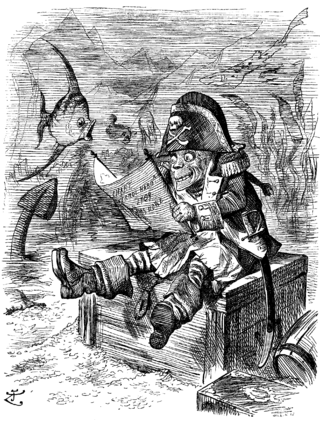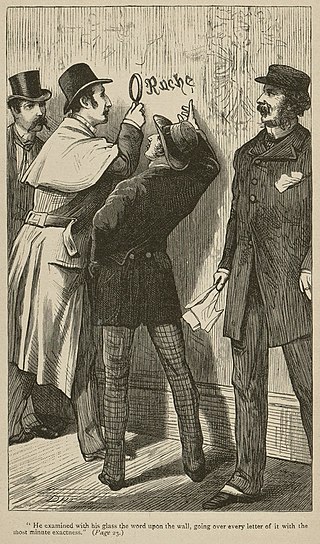
In ancient Greek mythology and religion, Leto is a goddess and the mother of Apollo and Artemis. She is the daughter of the Titans Coeus and Phoebe, and the sister of Asteria.

Arion was a kitharode in ancient Greece, a Dionysiac poet credited with inventing the dithyramb. The islanders of Lesbos claimed him as their native son, but Arion found a patron in Periander, tyrant of Corinth. Although notable for his musical inventions, Arion is chiefly remembered for the fantastic myth of his kidnapping by pirates and miraculous rescue by dolphins, a folktale motif.

A double entendre is a figure of speech or a particular way of wording that is devised to have a double meaning, one of which is typically obvious, and the other often conveys a message that would be too socially unacceptable, or offensive to state directly.

Hymen, Hymenaios or Hymenaeus, in Hellenistic religion, is a god of marriage ceremonies who inspires feasts and song. Related to the god's name, a hymenaios is a genre of Greek lyric poetry that was sung during the procession of the bride to the groom's house in which the god is addressed, in contrast to the Epithalamium, which is sung at the nuptial threshold. He is one of the winged love gods, the Erotes.

Admiral William Henry Smyth was an English Royal Navy officer, hydrographer, astronomer and numismatist. He is noted for his involvement in the early history of a number of learned societies, for his hydrographic charts, for his astronomical work, and for a wide range of publications and translations.

Davy Jones' locker is a metaphor for the oceanic abyss, the final resting place of drowned sailors and travellers. It is a euphemism for drowning or shipwrecks in which the sailors' and ships' remains are consigned to the depths of the ocean.

Admiral Charles Middleton, 1st Baron Barham, PC was a Royal Navy officer and politician. As a junior officer he saw action during the Seven Years' War. Middleton was given command of a guardship at the Nore, a Royal Navy anchorage in the Thames Estuary, at the start of the American War of Independence, and was subsequently appointed Comptroller of the Navy. He went on to be First Naval Lord and then First Lord of the Admiralty.

Admiral Edward Vernon was a Royal Navy officer and politician. He had a long and distinguished career, rising to the rank of admiral after 46 years service. As a vice admiral during the War of Jenkins' Ear, in 1739 he was responsible for the capture of Portobelo, Panama, seen as expunging the failure of Admiral Hosier there in a previous conflict. However, his amphibious operation against the Spanish port of Cartagena de Indias was a disastrous defeat. Vernon also served as a Member of Parliament (MP) on three occasions and was outspoken on naval matters in Parliament, making him a controversial figure.

Lady Penrhyn was built on the River Thames in 1786 as a slave ship.

A red herring is something that misleads or distracts from a relevant or important question. It may be either a logical fallacy or a literary device that leads readers or audiences toward a false conclusion. A red herring may be used intentionally, as in mystery fiction or as part of rhetorical strategies, or may be used in argumentation inadvertently.

James Richard Dacres was an officer of the Royal Navy who saw service during the French Revolutionary and Napoleonic Wars, and the War of 1812. A member of a substantial naval dynasty, he eventually rose to the rank of vice admiral, but is chiefly remembered for his engagement with the American frigate USS Constitution which saw the loss of his ship, HMS Guerriere.

The History of Little Goody Two-Shoes is a children's story published by John Newbery in London in 1765. The story popularized the phrase "goody two-shoes" as a descriptor for an excessively virtuous person or do-gooder.

Admiral of the White Sir John Balchen, sometimes written as Balchin, was an officer of the British Royal Navy with a long and distinguished career during the late 17th and early 18th centuries. In the course of his service at sea, Balchen saw action in numerous battles against the French and Spanish navies across 60 years and three separate wars. He was twice captured by the French in action, both times being exonerated and commended for the defence of his ships against overwhelming odds.
Captain Peter Turner Bover was an officer of the Royal Navy during the French Revolutionary Wars, who fired the first shot at the Spithead mutiny of 1797.

The Blockade of Porto Bello was a failed British naval action against the Spanish port of Porto Bello in present-day Panama between 1726 and 1727 as part of the Anglo-Spanish War. The British were attempting to blockade the port to stop the Spanish treasure fleet leaving for Spain with its valuable cargo. However tropical disease took its toll of the seamen to the extent that the British had to leave to re-crew, during which time the Spanish were able to re-commence shipping operations.
Sailors' superstitions are superstitions particular to sailors or mariners, and which traditionally have been common around the world. Some of these beliefs are popular superstitions, while others are better described as traditions, stories, folklore, tropes, myths, or legend.

There are 20 known contemporary accounts of the First Fleet made by people sailing in the fleet, including journals and letters. The eleven ships of the fleet, carrying over 1,000 convicts, soldiers and seamen, left England on 13 May 1787 and arrived in Botany Bay between 18 and 20 January 1788 before relocating to Port Jackson to establish the first European settlement in Australia, a penal colony which became Sydney.

The Curse of Scotland is a nickname used for the nine of diamonds playing card. The expression has been used at least since the early 18th century, and many putative explanations have been given for the origin of this nickname for the card.
















